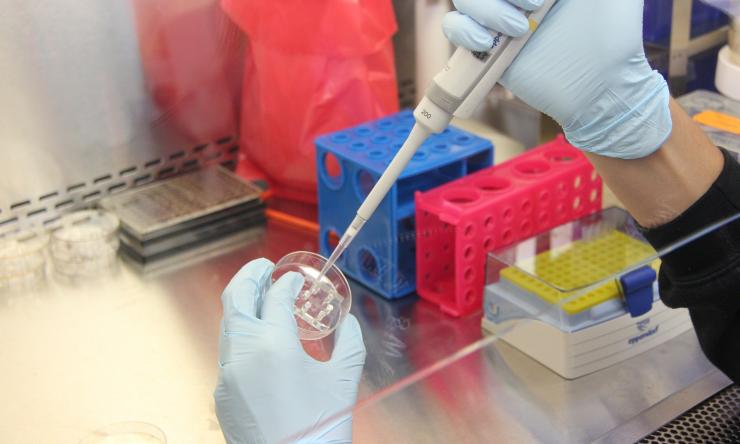Novel PROTAC enhances its intracellular accumulation and protein knockdown
Cancer therapies sometimes involve drugs that mediate the breakdown of specific intracellular proteins that participate in cancer formation and proliferation. Proteolysis-targeting chimeras or PROTACs are a promising type of protein-degrader molecules, but their effectiveness has been challenged by their limited ability to accumulate inside cells.
In this study published in the journal Nature Communications, a team led by researchers at Baylor College of Medicine developed an improved type of PROTAC that has enhanced intracellular accumulation and functions, not only as a degrader, but also as an inhibitor of the target protein. This exciting discovery led to a recently funded research grant from the National Cancer Institute (NCI) scored at top one percentile. The researchers hope that their work can be used to develop optimal PROTACs for clinical applications in the future.
“PROTACs are molecules made of two parts: one binds to the target protein and the other links to the enzyme ubiquitin ligase. The two parts are joined by a chemical linker,” said corresponding author Dr. Jin Wang, associate professor of pharmacology and chemical biology, molecular and cellular biology and and member of the Dan L Duncan Comprehensive Cancer Center at Baylor.
Once PROTAC binds to its target protein and the ubiquitin ligase, the ligase will attach ubiquitin groups to the surface of the target protein, which tags it for degradation by the proteasome inside the cell.
Wang and his colleagues were interested in improving PROTAC’s ability to degrade target proteins inside cells. Drawing from their years of expertise in the fields of organic chemistry and chemical biology, they experimented with different chemical binders to determine how they affected PROTAC’s efficacy. Serendipitously, they discovered that a specific type of chemistry can enhance PROTAC’s intracellular accumulation.
Making an improved PROTAC
The researchers worked with a well-known target of PROTAC, the enzyme Bruton’s tyrosine kinase (BTK). They used different types of binders – reversible noncovalent, reversible covalent, and irreversible covalent – to construct PROTACs that targeted BTK.
“When we compared the different constructs in their ability to degrade BTK, we were excited to discover that the cyano-acrylamide-based reversible covalent chemical binder significantly enhanced the intracellular accumulation and target engagement of PROTACs, much better than the others,” said co-first author Dr. Wen-Hao Guo, a postdoctoral associate in the Wang lab.
“Furthermore, we developed RC-1, a reversible covalent BTK PROTAC that was effective as both a BTK inhibitor and degrader,” said co-first author Dr. Xiaoli Qi, assistant professor in pharmacology and chemical biology at Baylor. “This represents a novel mechanism of action for PROTACs. Our work suggests the possibility that this strategy to improve PROTACs can be applied to target other molecules.”
Other contributors to this work include Xin Yu, Yang Liu, Chan-I Chung, Fang Bai, Xingcheng Lin, Dong Lu, Lingfei Wang, Jianwei Chen, Lynn Hsiao Su, Krystle J. Nomie, Feng Li, Meng C. Wang, Xiaokun Shu, José N. Onuchic, Jennifer A. Woyach and Michael L. Wang. The authors are affiliated with one or more of the following institutions: Baylor College of Medicine, The University of Texas MD Anderson Cancer Center-Houston, University of California-San Francisco, Rice University, Massachusetts Institute of Technology and The Ohio State University-Columbus.
This work was supported in part by National Institute of Health (R01-GM115622 and R01-CA250503), Core Facility Support Award from the Cancer Prevention Research Institute of Texas (RP160805), Baylor College of Medicine and Howard Hughes Medical Institute. The NSF (Grants PHY- 2019745 and CHE-1614101), the Welch Foundation (Grant C-1792), a Cancer Prevention and Research Institute of Texas (CPRIT) Scholarship in Cancer Research and the Proteomics Core (sponsored by NIH P30 CA030199) supported work at the Center for Theoretical Biological Physics.










